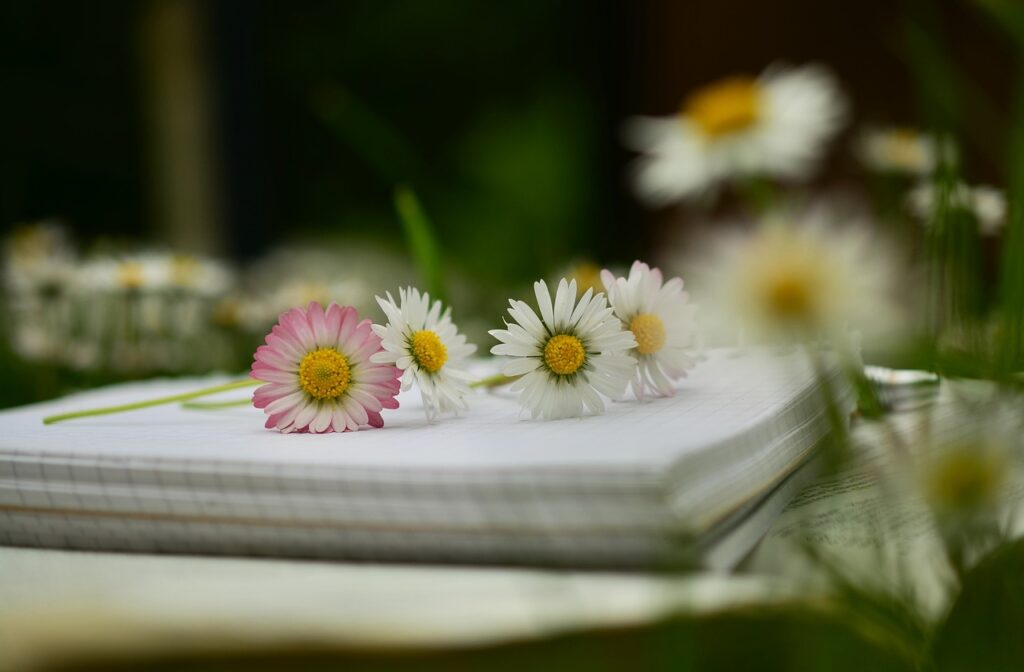In our busy, overbooked lives, finding moments of to engage in soothing self-care can be challenging. However, one simple yet powerful self-care practice has stood the test of time for fostering personal growth, enhancing creativity, and promoting mental wellness: journaling. Whether you’re new to the practice or looking to deepen your engagement with your inner world, filling blank notebooks with reflective writing and visual images can profoundly impact your life.
Starting a New Journaling Practice
Starting a journaling practice involves regularly recording your thoughts, feelings, and experiences in written or visual form. You may choose to write in a notebook or you may be drawn to expressing yourself visually in a sketchbook. There is no right or wrong way to begin you journaling habit. Your practice can be as structured or as freeform as you like. The key is consistency—dedicating time each day, or as often as you are comfortable—to reflect on your inner world. A blank notebook can become a canvas for your mind, where you can explore ideas, track progress, and let go of stress and other pent-up emotions.
Your Journal is a Tool for Enhancing Creativity
One of the most celebrated benefits of journaling is its ability to ignite creativity and boost problem solving skills. By writing on a regular basis, you give your brain the freedom to explore new ideas without judgement. This process can lead to unexpected insights and innovative solutions to problems. By jotting down random thoughts, sketches, or story ideas, your blank notebook can become a playground for creativity. By saving your entries and reviewing them at regular intervals, you might discover patterns or recurring themes in your Journal that can inspire larger projects or artistic endeavours.
Journaling for Mental and Physical Health
Journaling is not just about creativity; it’s also a powerful tool for enhancing physical wellness and mental health. For example, studies have identified a link between expressive writing and the reduction of inflammation in people with rheumatoid arthritis. Daily writing allows you to process emotions, which can reduce stress and anxiety. By articulating your thoughts, you gain clarity and perspective on issues that may be troubling you. This can lead to better problem-solving skills and a greater sense of control over your life.
Journaling is a form of self-care. It offers a private space where you can be honest with yourself, free from external judgments. By writing about positive events and achievements you can help boost your self-esteem and help you develop a more positive self-image. Studies have also shown that regular journaling can improve mood, increase resilience, and even enhance immune function.
Getting Started with Your Journaling Practice
Starting a journaling practice is simple. All you need is a blank notebook and a pen. Here are a few tips to help you get started:
- Set aside time to journal: Find a quiet time and place where you can write without interruptions. Even 10-15 minutes a day can make a difference. In the early stages of your journaling practice, you may want to try writing in brief spurts everyday. If it turns out that journaling daily doesn’t fit your schedule, that’s OK. Maybe writing once a weeks is best for you. Whatever schedule you choose, try to be consistent.
- Write Freely: Don’t worry about grammar, spelling, or style. The point of journaling is to express yourself honestly and freely.
- Use Prompts: If you’re unsure what to write about, use prompts to get started. Questions like “What am I grateful for today?” or “What challenges did I face today?” can spark meaningful reflections.
- Reflect and Review: Periodically review your entries to gain insights into your growth and patterns. This can be a powerful tool for self-awareness and personal development.
Journaling is a versatile and accessible practice that can significantly enhance creativity, and support your physical and mental health. By starting a regular writing practice you can unlock a deeper understanding of yourself and foster a sense of inner peace. So grab a blank notebook and start your journaling journey today—you may be surprised at the transformative power that flows out of the tip of your pen!
Journaling Prompt: Quickly write a list of 5-10 moments thought out your day when you might be able to spend 15 minutes journaling. Would you get up a little bit earlier? Shut down your devices before bed and spend time writing? How would a regular journaling practice fit into your schedule?

